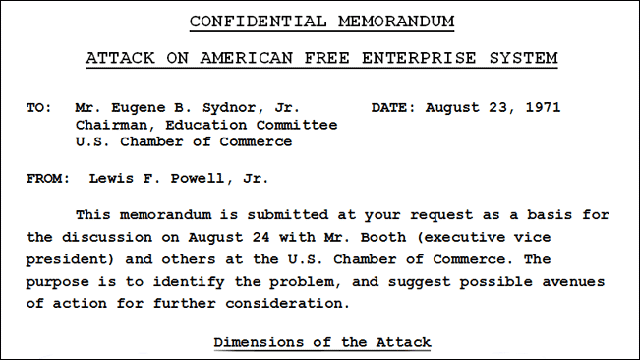I was talking recently with a very learned and progressive scholar of history about the depth of the right wing’s messaging strategy, and he was unfamiliar with this document that helped create and define a broad and effective corporate-conservative machine: the Powell Memorandum. We all need to know this history.
From Wikipedia:
Based in part on his experiences as a corporate lawyer and as a representative for the tobacco industry with the Virginia legislature, [Lewis Franklin Powell, Jr.] wrote the Powell Memo to a friend at the U.S. Chamber of Commerce. The memo called for corporate America to become more aggressive in molding politics and law in the U.S. and may have sparked the formation of one or more influential right-wing think tanks.
In August 1971, prior to accepting Nixon’s request to become Associate Justice of Supreme Court, Lewis Powell had sent to the leadership of the U.S. Chamber of Commerce the “Confidential Memorandum”, better known as the Powell Memorandum, and still under the radar of general public. It sounded an alarm with its title, “Attack on the American Free Enterprise System.” The previous decade had seen the increasing regulation of many industries. Powell argued, “The most disquieting voices joining the chorus of criticism came from perfectly respectable elements of society: from the college campus, the pulpit, the media, the intellectual and literary journals, the arts and sciences, and from politicians.” In the memorandum, Powell advocated “constant surveillance” of textbook and television content, as well as a purge of left-wing elements.
In an extraordinary prefiguring of the social goals of business that would be felt over the next three decades, Powell set his main goal: changing how individuals and society think about the corporation, the government, the law, the culture, and the individual. Shaping public opinion on these topics became, and would remain, a major goal of business.
– http://en.wikipedia.org/wiki/Lewis_F._Powell,_Jr.#The_Powell_Memorandum
And here’s an excerpt from a 2009 essay about the influence and impact of the Powell Memorandum:
The memo is important because it reveals the power that conservatives attributed to the political nature of education and the significance this view had in shaping the long-term strategy they put into place in the 1960’s and 1970’s to win an ideological war against liberal intellectuals, who argued for holding government and corporate power accountable as a precondition for extending and expanding the promise of an inclusive democracy. The current concerted assault on government and any other institutions not dominated by free-market principles represents the high point of a fifty-year strategy that was first put into place by conservative ideologues such as Frank Chodorov, founder of the Intercollegiate Studies Institute; publisher and author William F. Buckley; former Nixon Treasury Secretary William Simon, and Michael Joyce, the former head of both the Olin Foundation and the Lynde and Harry Bradley Foundation. The Powell Memo is important because it is the most succinct statement, if not the founding document, for establishing a theoretical framework and political blueprint for the current assault on any vestige of democratic public life that does not subordinate itself to the logic of the alleged free market.
[…]
For Powell, the war against liberalism and a substantive democracy was primarily a pedagogical and political struggle designed both to win the hearts and minds of the general public and to build a power base capable of eliminating those public spaces, spheres and institutions that nourish and sustain what Samuel Huntington would later call (in a 1975 study on the “governability of democracies” by the Trilateral Commission) an “excess of democracy.”[5] Central to such efforts was Powell’s insistence that conservatives nourish a new generation of scholars who would inhabit the university and function as public intellectuals actively shaping the direction of policy issues. He also advocated the creation of a conservative speakers bureau, staffed by scholars capable of evaluating “textbooks, especially in economics, political science and sociology.”[6] In addition, he advocated organizing a corps of conservative public intellectuals who would monitor the dominant media, publish their own scholarly journals, books and pamphlets, and invest in advertising campaigns to enlighten the American people on conservative issues and policies. The Powell Memo, while not the only influence, played an important role in convincing a “cadre of ultraconservative and self-mythologizing millionaires bent on rescuing the country from the hideous grasp of Satanic liberalism”[7] to match their ideological fervor with their pocketbooks by “disbursing the collective sum of roughly $3 billion over a period of thirty years in order to build a network of public intellectuals, think tanks, advocacy groups, foundations, media outlets, and powerful lobbying interests.”[8]
